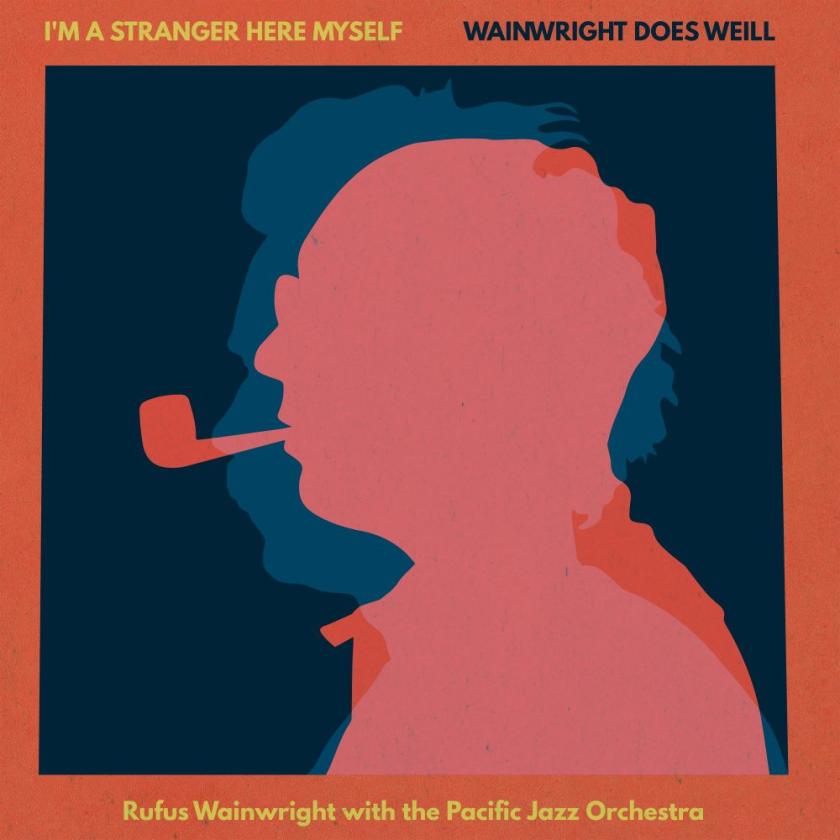Rufus Wainwright has long expressed his admiration for “pop music with an operatic sensibility, the profane with the divine”, inspired by The Unknown Kurt Weill and Stratas Sings Weill, the albums recorded by Greek-Canadian soprano Theresa Stratus whose final performance at the Met thirty years ago was as Jenny in Brecht-Weill’s opera The Rise and Fall of the City of Mahagonny.
Recorded live with the Pacific Jazz Orchestra under the baton of Chris Walden, who is also responsible for the arrangements, I’m a Stranger Here Myself was recorded live in March 2024 at the United Theatre on Broadway, Los Angeles. The project began a year earlier, Wainwright backed by smaller forces, at Café Carlyle, the celebrated (and pricey) cabaret spot on New York’s Upper East Side where, in happier times, Woody Allen played clarinet. One track, “Surabaya, Johnny”, is included from those sessions, while “Zuhälterballade”, featuring Viola Odette Harlow and the Netherlands’ Metropole Orkest conducted by Simon Dobson, was recorded in Hilversum, Netherlands late last year.
“The genius of Kurt Weill is something of an enigma – and it is probably his own fault… but it is perhaps his own versatility that prevents any single singer from claiming the crown for the definitive interpretation of his songs,” writes Peter Asher in the briefest of liner notes. “Born German in 1900 and died an American in 1950, Weill was, in every sense, a modern man. From an era when the divisions between pop music and musical theatre, between hit songs and opera were virtually impenetrable, he ignored them absolutely.”
Which makes him, of course, perfect for Wainwright. But as with so much of his prodigious output, I’m a Stranger Here Myself is something of a curate’s egg. As Asher points out, he “inhabits” the songs much as a singer-songwriter would – sometimes, one feels, a little too much. The opening track in particular, “September Song”, one of the best-known numbers, is overly mannered. Wainwright’s tone is often harsh, and while there are lovely moments of quiet tenderness there’s also a lot of rather ugly portamento, the singer crescendo-ing through notes which sound as if a Hoover powering up: “Sept-EEEEEM-ber, Nov-EEEEEM-ber”. A bit coarse. There are similar moments elsewhere.
The title song (made famous by Mary Martin) swings nicely, as does “Die Muschel von Margate” originally from Leo Lania’s play Konjunktur (Oil Boom), for which Weill provided incidental music. Sung here in English, it’s about seashells giving way to Shell Oil, as the black stuff is discovered under the nearby sands. An early protest song! The tangos that are “Mastrosen Song” (culled from Happy Ending) and “Youkali” (from the cabaret Maria Galante) work well, Wainwright’s reedy sound perfectly suited to the French of the latter, and to “Je Ne T’aime Pas”. He should record albums of Brel and Legrand.
Many of the numbers here are familiar across many generations but arguably none more so than “Mack the Knife”. Originally from the prologue to The Threepenny Opera, to which it was added only at the last minute in 1928, and performed in English for the first time in 1933, it has since been recorded by scores of people, among them Louis Armstrong, for whom it was a big hit, despite several radio station bans because of the violence in the lyric. A few years later, Bobby Darin’s version hit the top spot. Wainwright sings it half in German, half in English and the clarity of his diction ensures that the grisly nature of the story (often rendered comic) truly comes across.
Like all Wainwright’s work, I’m a Stranger Here Myself is compelling. One suspects he does not take direction well, which is a pity. Beyond that, a proper liner note (Asher’s is little more than a paean to Rufus) would have added immeasurably and it’s surprising the singer did not push for one.















Add comment